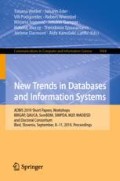Abstract
Together with the prevalence of e-commerce and online shopping, recommender systems have been playing an increasingly important role in people’s daily lives in terms of discovering their potential preferences. Therein, users’ preferences are mostly reflected by their online behaviors, specially their evaluation towards particular items, e.g., numeric ratings and textual reviews. Many existing recommender systems focus on using item ratings to determine users’ preferences, while others provide approaches using textual reviews instead. In this work, via a case study on the Amazon movies data, we compare the recommendation results when using ratings or reviews, as well as that of combining both.
Access this chapter
Tax calculation will be finalised at checkout
Purchases are for personal use only
Notes
- 1.
- 2.
This work has been partially supported by the Virpa D project funded by Business Finland.
References
Baccianella, S., Esuli, A., Sebastiani, F.: Sentiwordnet 3.0: an enhanced lexical resource for sentiment analysis and opinion mining. In: LREC (2010)
Cambria, E., Speer, R., Havasi, C., Hussain, A.: Senticnet: a publicly available semantic resource for opinion mining. In: Commonsense Knowledge (2010)
Eirinaki, M., Abraham, S., Polyzotis, N., Shaikh, N.: Querie: collaborative database exploration. IEEE Trans. Knowl. Data Eng. 26(7), 1778–1790 (2014)
Ge, X., Chrysanthis, P.K., Pelechrinis, K.: MPG: not so random exploration of a city. In: MDM (2016)
Hutto, C.J., Gilbert, E.: VADER: a parsimonious rule-based model for sentiment analysis of social media text. In: ICWSM (2014)
Júnior, E.A.C., de Andrade Lopes, A., Amancio, D.R.: Word sense disambiguation: a complex network approach. Inf. Sci. 442–443, 103–113 (2018)
Koskela, M., Simola, I., Stefanidis, K.: Open source software recommendations using github. In: Méndez, E., Crestani, F., Ribeiro, C., David, G., Lopes, J.C. (eds.) TPDL 2018. LNCS, vol. 11057, pp. 279–285. Springer, Cham (2018). https://doi.org/10.1007/978-3-030-00066-0_24
Li, X., Zhang, Z., Stefanidis, K.: Mobile app evolution analysis based on user reviews. In: SoMeT (2018)
Liu, J., Dolan, P., Pedersen, E.R.: Personalized news recommendation based on click behavior. In: IUI (2010)
Ntoutsi, E., Stefanidis, K., Rausch, K., Kriegel, H.: Strength lies in differences: diversifying friends for recommendations through subspace clustering. In: CIKM (2014)
Pazzani, M.J., Billsus, D.: Content-based recommendation systems. In: Brusilovsky, P., Kobsa, A., Nejdl, W. (eds.) The Adaptive Web. LNCS, vol. 4321, pp. 325–341. Springer, Heidelberg (2007). https://doi.org/10.1007/978-3-540-72079-9_10
Sandvig, J.J., Mobasher, B., Burke, R.D.: A survey of collaborative recommendation and the robustness of model-based algorithms. IEEE Data Eng. Bull. 31(2), 3–13 (2008)
Stefanidis, K., Ntoutsi, E., Kondylakis, H., Velegrakis, Y.: Social-based collaborative filtering. In: Encyclopedia of Social Network Analysis and Mining, 2nd edn (2018)
Stratigi, M., Kondylakis, H., Stefanidis, K.: FairGRecs: fair group recommendations by exploiting personal health information. In: Hartmann, S., Ma, H., Hameurlain, A., Pernul, G., Wagner, R.R. (eds.) DEXA 2018. LNCS, vol. 11030, pp. 147–155. Springer, Cham (2018). https://doi.org/10.1007/978-3-319-98812-2_11
Yin, Z., Gupta, M., Weninger, T., Han, J.: LINKREC: a unified framework for link recommendation with user attributes and graph structure. In: WWW (2010)
Author information
Authors and Affiliations
Corresponding author
Editor information
Editors and Affiliations
Rights and permissions
Copyright information
© 2019 Springer Nature Switzerland AG
About this paper
Cite this paper
Stratigi, M., Li, X., Stefanidis, K., Zhang, Z. (2019). Ratings vs. Reviews in Recommender Systems: A Case Study on the Amazon Movies Dataset. In: Welzer, T., et al. New Trends in Databases and Information Systems. ADBIS 2019. Communications in Computer and Information Science, vol 1064. Springer, Cham. https://doi.org/10.1007/978-3-030-30278-8_9
Download citation
DOI: https://doi.org/10.1007/978-3-030-30278-8_9
Published:
Publisher Name: Springer, Cham
Print ISBN: 978-3-030-30277-1
Online ISBN: 978-3-030-30278-8
eBook Packages: Computer ScienceComputer Science (R0)

